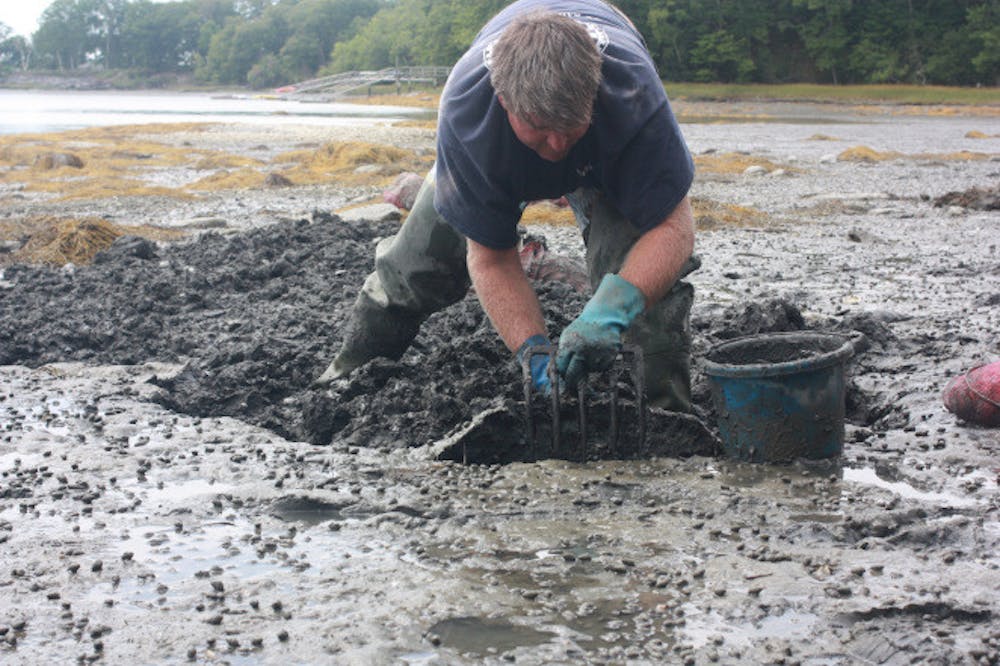As the Carolinas reel from the destruction caused by Hurricane Florence, the quiet coast of Maine is experiencing climate change in a much slower, yet still threatening, manner.
Kathryn Olson ’05 discussed the impact of climate change on this area in her talk entitled “Farms, Fish and Forests: An Ethnography of Climate Change in Maine.”
In Maine, temperatures have risen twice as much as those in the rest of the United States, and the Bay of Maine is the fastest-warming body of water in the world. Maine has a highly resource-based economy with industries in fishing and forestry, and for the past several years, Olson has been using ethnographic interviews, demographic surveys, observations and visual data to inform her work.
Olson has focused her recent research on what she calls the “Living Change Project” in which she investigates the subtle changes in identity, work and place in the wake of climate change, especially in her home state of Maine.
Farmers have been adapting to winters with shorter freezes and drought alternating with heavy precipitation in the summers and longer falls. These changes in the seasons have had a harmful impact on harvesting seasons and crop yield.
Foresters, too, are experiencing environmental and economic changes. With unpredictable freezing and thawing patterns, new populations of invasive species of animals and plants are wreaking havoc in Maine. Despite these obvious concerns, Olson found that foresters are more reluctant to admit the negative impacts of climate change, and they tend to view the forests as controlled by man rather than by nature.
Fishermen have faced perhaps the most significant plight. The number of soft shell clams, a specialty from the coast of Maine, are down by as much as 70 percent in some places on the coast due to a recent explosion in the population of green crabs, an invasive species that thrives in warm waters. Development of houses and tourist destinations along the coast has also greatly diminished fishing areas accessible to fishermen.
These challenges have forced the industry to adjust. For example, some have turned to aquaculture, the practice of farming fish, as a way to protect soft shell clams, as well as mussel populations, from the green crabs. Many Maine locals in the culinary industry are beginning to harvest the green crabs and popularize them on the market, with slow but promising success. According to an interview that Olson conducted with a fisherman, the fishery is only able to produce around ten percent of what it once could.
Olson’s talk drew the attention of many students and faculty, as her presentation highlighted the imminent issues facing local communities due to climate change. Here in Vermont, farmers and beneficiaries of resource-based industries are at risk in ways similar as those in Maine.
“Having spent the summer living [on] sailboats along the coast of Maine dodging lobster pots every day, I was particularly interested in the invasive green crabs and in the lobstermen’s pragmatic view of climate change,” Hannah Redmon ’20 said. “I appreciated how [Olson] examined the effects of climate change on Maine’s major industries through the eyes of people working in these industries every day. The way she combined science, sociology, creative writing and photography made her project both useful and engaging, no matter where her readers are coming from.”
Alec Fleischer ’20.5 said that Olson’s talk “clearly showed [that] climate change is already altering Maine’s formerly-stable marine and forestry sectors.
“These highlighted effects only mark the beginning of unprecedented problems that our generation will face in Maine, in Vermont, and across the world,” he said. “We need to rapidly transition [away from] fossil fuels and begin investing vast sums in climate mitigation.”
Maine’s future, according to Olson, lies in economic diversification and developing long-term sustainable industries.
Throughout this project, Olson has spent much of her time engaging with climate change skeptics and deniers, and encouraging tolerance and understanding of other perspectives.
From enacting large-scale policy changes for mitigating climate change to bolstering grassroots participation in the fight against climate change, Olson encourages working beyond academia and using social media and blogs, to spread positive messages. Olson left the audience feeling positive about how experts are addressing climate change, noting that the people she interviewed from all different economic and social backgrounds were working hard to adapt to the changes coming their way.
For more information on Olson and her work, see her blog:
www.livingchange.blog/
Climate Change at Home: Kathryn Olson ’05 Discusses Growing Threat to ‘Farms, Fish and Forests’

COURTESY PHOTO
Clam harvester Chad Coffin in Freeport, Maine, goes through concentrated mud where green crabs have killed native grasses.
Clam harvester Chad Coffin in Freeport, Maine, goes through concentrated mud where green crabs have killed native grasses.
Comments



